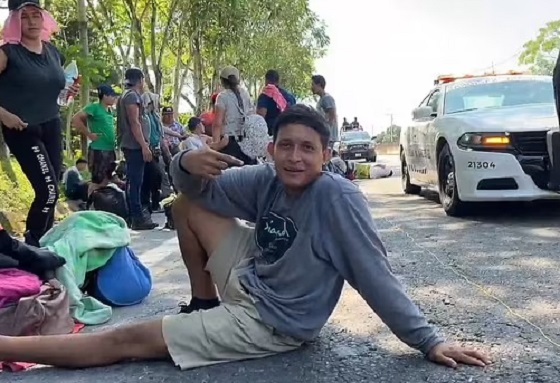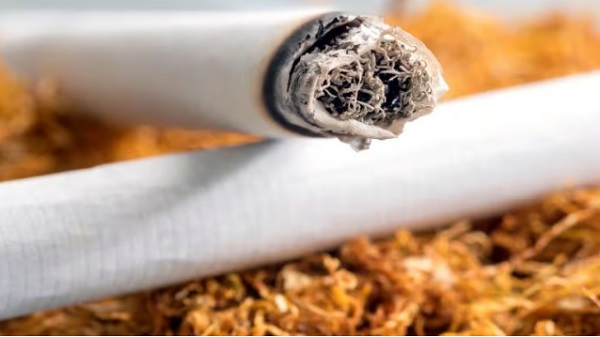illegal immigration
“We pray Trump doesn’t win”: 150,000 migrants in Mexico are rushing to the border before the election

From ToddBensman.com
By Todd Bensman as published by The Daily Mail
“I love Kamala Harris,’ a young Venezuelan man declared as he rested on the side of a highway in southern Mexico last week.
His belongings were heaped at his feet. Hundreds of fellow migrants stretched out along the roadway in both directions.
They’re headed for the U.S. and nearly all of them have an opinion about who should be America’s next president.
Donald Trump, no,’ the Venezuelan man said, shaking his head and dragging his thumb across his throat in a slicing motion.
He is one of thousands of migrants – from all over the world – joining a new rush traveling north from southern Mexico toward the U.S. border, less than two weeks before the presidential election.
I went to Tapachula in southwest Mexico near the border with Guatemala to investigate why they were on the move – again.
Throughout 2022 and 2023, massive caravans – some reportedly as large as 6,000-strong – became a common feature of the immigration crisis.
The mass migration became such a humanitarian and public relations disaster for the Biden-Harris Administration that U.S. Secretary of State Antony Blinken was dispatched to meet with Mexico’s president in December 2023 to demand that he impose stricter immigration controls.
And the pressure campaign worked.

‘I love Kamala Harris ,’ a young Venezuelan man declared as he rested on the side of a highway in southern Mexico last week. He is one of thousands of migrants – from all over the world – joining a new rush traveling north from southern Mexico toward the U.S. border, less than two weeks before the presidential election. (Above) Migrant caravan near Tapachula, Mexico on October 20, 2024
In January, I reported for DailyMail.com on Mexican police and military roundups near the U.S. border.
Migrants who made it to those northern provinces were detained and shipped hundreds of miles back south to cities like Tapachula in the southwest or Villahermosa near the gulf.
The Mexican media called it ‘Operation Carousel.’
And for nearly 10 months, the caravans stopped.
But now, they’re back on.
The migrants I spoke to on the road this week believe that this may be their last chance.
Many of them hope to reach the U.S. before November 5 because they fear that, if Trump is re-elected, he’ll close the southern border and enforce longstanding immigration laws.
‘If [Trump] wins… one has to do what the government says, [wait] for my turn,’ said Carlos, a Honduran man in a caravan 30 miles north of Tapachula.
In reality, it’s unlikely that these migrants will be able to make the 1,300-mile trek in the next two weeks. But they can try.
And there’s another more complicated reason that the caravans have started back up: The Mexican government is encouraging them.
The caravans that I traveled with were escorted by Mexican National Guard escorts, something that I have witnessed. Perhaps, it not only the migrants growing restless, so, too, are the authorities.
For months, an estimated 150,000 U.S.-bound migrants have been bottled up in increasingly dire conditions in Tapachula, as ever more arrive there from South and Central America.
In fact, the true number massing in southern Mexico may even be in the hundreds of thousands.
I’ve visited Tapachula at least five times over the last decade and I’ve never seen it so crowded. All the hotels and motels are packed. Immigrant shelters are at full capacity.
Those who cannot afford accommodations – including women and children – sleep on the streets and in city parks, packed in like sardines.
Remember this as you hear Vice President Kamala Harris tout new statistics showing a precipitous decline in the number of illegal U.S. border crossings in 2024.
She attributes the positive change to the recent enforcement of U.S. asylum laws. But that’s not the full story.
Even the Department of Homeland Security admitted earlier this month that the drop in illegal US border crossings is due, in part, to, ‘increased Mexican enforcement efforts.’
Indeed, at the White House’s behest, Mexico has been containing these people for months in southern cities like Tapachula and Villahermosa, which have come to resemble sprawling, open-air refugee camps.
Now the situation is becoming untenable.
According to those I’ve spoken to, the Mexican government’s promises to provide travel documents to the migrants have never materialized.
In an apparent recognition of the overcrowding, the U.S. government is now building a new migration processing facility in Tapachula.
Meanwhile, the Mexican government is starting to transfer migrants out of Tapachula into surrounding cities to relieve the growing pressure.
And, the coming election is only heightening tensions.
Incredible drone shows large caravan migrants heading to the US
A group of Ghanaian men in a congested park in Tapachula told me that they feared a Trump presidency.
‘We do not like Donald Trump, because he don’t like us,’ one man said.
To him, Kamala Harris is the preferred option.
Another Ghanian man said he plans to wait for the results of the election, before making his next move: ‘If after election day [Harris is elected], we know that everything is good, then we can enter.’

A group of Ghanaian men in a congested park in Tapachula told me that they feared a Trump presidency. ‘We do not like Donald Trump, because he don’t like us,’ one man said. To him, Kamala Harris is the preferred option.
A middle-aged Venezuelan man also in the park reiterated those fears: ‘We know that if Donald Trump wins, all the migrants will be kicked out the [United States]… we hope that he doesn’t win.’
It is still unclear how far north these migrant caravans will get before America votes – and I suspect that many migrants only wish to escape Tapachula.
But, certainly, it seems likely that after November 5 – Mexico’s newly-elected president will consider her country’s part in ‘Operation Carousel’ to be complete and lift any remaining immigration controls.
That would mean hundreds of thousands of migrants, who have been waiting out the U.S. election in Mexico, may be permitted to – once again – try their luck at crossing illegally into the U.S.
As far as they’re concerned, a Kamala Harris presidency would mean that America’s borders will be thrown open.
If Donald Trump is elected president, their plans may change.
illegal immigration
Los Angeles declares a state of emergency over ICE deportations

Los Angeles County leaders have declared a state of emergency over Immigration and Customs Enforcement operations, a move that federal officials and conservative leaders are blasting as a political stunt that undermines the rule of law.
JUST IN: Los Angeles County declares a state of emergency in response to the ICE raids, will provide rent relief.
The LA County Board of Supervisors made the move as the Trump admin continues to ramp up the raids.
“The move allows the LA County Board of Supervisors to provide… pic.twitter.com/DqtvvfhWDu
— Collin Rugg (@CollinRugg) October 15, 2025
On Tuesday, the Los Angeles County Board of Supervisors approved a “Proclamation of Local Emergency for Federal Immigration Actions,” with only one supervisor, Kathryn Barger, voting no. The board claimed that ICE raids “created fear, disrupted neighborhoods, and destabilized families, workers, and businesses” across the region.
Supervisor Lindsey Horvath, who introduced the measure, said the declaration “ensures that the full weight of County government is aligned to support our immigrant communities who are being targeted by federal actions.” But critics say the move has nothing to do with public safety and everything to do with shielding criminal illegal aliens from deportation. “The only emergency is the one the residents of Los Angeles face after electing officials who give a middle finger to the law,” an ICE spokesperson told Fox News, adding that the agency is simply enforcing President Trump’s mandate to remove those in the country illegally — including violent offenders.
ICE spokesperson Emily Covington went further, saying, “Perhaps the board should ‘supervise’ funds to support law-abiding fire victims who still haven’t recovered instead of criminal illegal aliens seeking refuge in their sanctuary city. While they publicly fear-monger, I would be shocked if they didn’t agree with ICE removing a child rapist from their neighborhood.”
Attorney General Pam Bondi called the move “illegal” and accused Los Angeles County of aiding and abetting lawbreaking. “They don’t care about their citizens,” Bondi said on Fox News’ Hannity. “It’s hurting our citizens, and we’re going to keep fighting for the American people.” Chair Kathryn Barger — the lone dissenting vote — also warned that the county’s action could trigger federal consequences, noting that “the federal government has sole authority to enforce federal immigration law, and local governments cannot impede that authority.” She added that the county should instead push for “meaningful immigration reform that is fair, pragmatic, and creates legal pathways for those who contribute to our communities.”
The board’s declaration allows county departments to “mobilize resources, expedite contracting and procurement, coordinate interagency response, and request state and federal assistance” for residents impacted by ICE operations. It will remain in effect until the supervisors vote to terminate it. Homeland Security Secretary Kristi Noem announced in August that between June and August, ICE agents arrested more than 5,000 illegal immigrants across Los Angeles County — including gang members, child predators, and murderers. “Families protected. American taxpayers spared the cost of their crimes AND the burden of their benefits,” Noem said at the time. “Thank you to our brave law enforcement officers. Make no mistake: if you are here illegally, we will find you, arrest you, and send you back. This is just the beginning.”
Critics of the county’s new proclamation say it sends the opposite message — one that rewards lawlessness and punishes those enforcing the law. As ICE continues its work to deport violent offenders, Los Angeles’ leadership appears more focused on fighting federal immigration law than on protecting the residents they were elected to serve.
(AP Photo/Eric Thayer)
Business
Truckers see pay surge as ICE sweeps illegal drivers off U.S. highways

Quick Hit:
American truckers say they’re finally earning more per mile as President Donald Trump’s enforcement push clears illegal drivers off U.S. highways. Truckers have reported 50% pay increases on some routes following a surge of ICE activity and Transportation Secretary Sean Duffy’s crackdown on safety and work permit violations.
Key Details:
- A trucker on X said his usual Chicago-to-Fargo run jumped from $1,200 to $1,800, crediting the Trump administration’s immigration enforcement for thinning out illegal competitors.
- ICE and federal transportation officials have detained or removed illegal drivers in multiple states, with reports of Serbian and Indian drivers losing their commercial licenses after failing to prove legal entry into the U.S.
- FreightWaves founder Craig Fuller noted spot rates have risen about 2% despite weak demand, as “bottom feeders” who undercut prices are being “squeezed out of the market.”
Diving Deeper:
As President Trump’s immigration enforcement intensifies, American truckers are seeing something rare in a sluggish cargo economy: rising wages. Across online freight boards and social media, truckers are crediting the administration’s “Compliance Crunch” — a combination of ICE raids and new safety regulations — for clearing out illegal drivers who had been depressing pay rates for years.
One trucker wrote on X that his typical Chicago-to-Fargo route, which paid $1,200 before the election, now brings in $1,800. “Needless to say, I took him up on the offer,” he posted. “Lord do I hope this hangs around a little bit.”
Transportation Secretary Sean Duffy has been enforcing long-ignored safety and documentation rules, targeting companies that hired drivers without valid immigration status or complete customs paperwork. “We have Americans who’ve been in trucking for 50 years through family businesses,” Duffy told Fox News on October 8. “They can’t do business anymore because you have these illegals coming in, living out of their trucks… they can’t speak the language, and they come in under price — way under price.”
According to reports from The Serbian Times, at least fifteen Serbian drivers have been detained in recent days, and agents have begun seizing commercial driver’s licenses from migrants lacking proof of legal entry. Many of these drivers, primarily from Eastern Europe and South Asia, were able to operate under the Biden administration with minimal oversight — often undercutting legitimate American drivers by accepting lower pay.
Craig Fuller of FreightWaves observed that even though freight volumes remain “anemic,” per-mile spot rates rose roughly 2% as noncompliant firms exit the market. “We are seeing the bottom feeders get squeezed out,” he wrote, adding that most contract carriers haven’t yet felt the wage impact but likely will as enforcement spreads.
Industry experts say nearly one-third of the nation’s freight has been hauled by non-citizen drivers, which trucking analyst Bill Skinner called “not just a safety issue — it’s a national security risk.”
While some corporate logistics networks such as Amazon and Walmart may eventually argue that higher trucking wages could drive up costs, analysts note that the increases are modest and likely offset by fewer accidents, delays, and fraud cases tied to unlicensed or illegal operators.
-

 Agriculture21 hours ago
Agriculture21 hours agoDanish Cows Collapsing Under Mandatory Methane-Reducing Additive
-

 Bruce Dowbiggin2 days ago
Bruce Dowbiggin2 days agoA Story So Good Not Even The Elbows Up Crew Could Ruin It
-

 Alberta2 days ago
Alberta2 days agoCanada’s heavy oil finds new fans as global demand rises
-

 Daily Caller1 day ago
Daily Caller1 day agoTrump Reportedly Planning Ground Troops, Drone Strikes On Cartels In Mexico
-

 Addictions2 days ago
Addictions2 days agoThe War on Commonsense Nicotine Regulation
-

 Health2 days ago
Health2 days agoRFK Jr’s argument for studying efficacy of various vaccines
-

 Business1 day ago
Business1 day agoTrump’s Tariffs Have Not Caused Economy To Collapse
-

 Alberta1 day ago
Alberta1 day agoAlberta government’s plan will improve access to MRIs and CT scans



